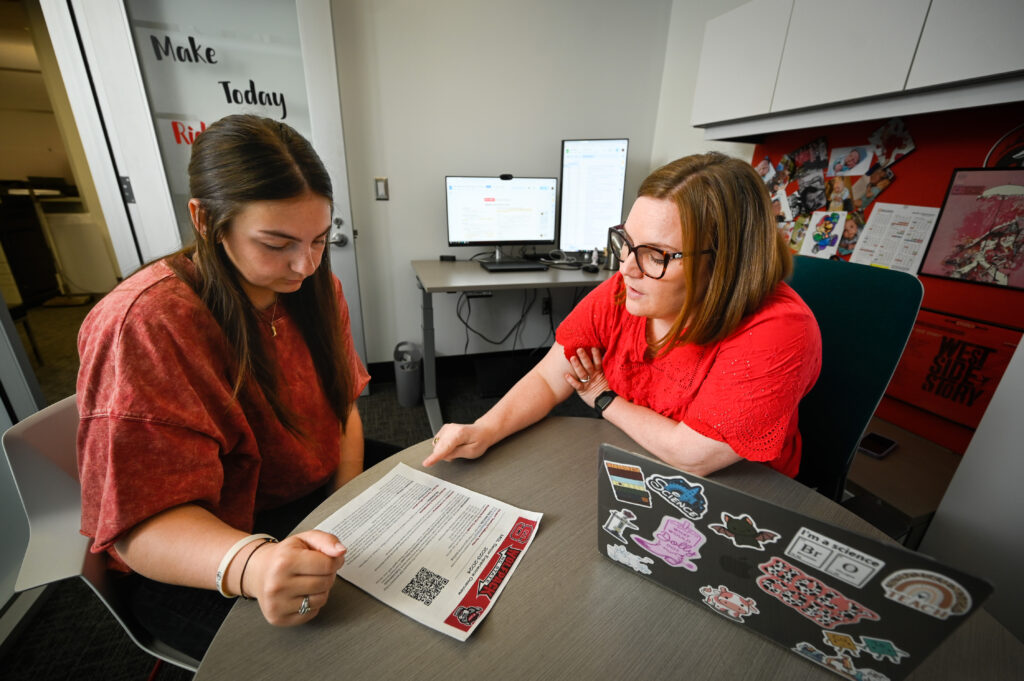Academic Advising and Recruitment

Academic Advising is an intentional process designed to support students as they develop and pursue educational, career and personal goals. The ultimate goal of the student-advisor partnership is for students to increase their personal agency and critical thinking skills, and apply both to their life choices in college and beyond. Academic advisors empower students to make timely and well-informed choices by helping them connect with university and community resources, identify opportunities, assess alternatives and predict possible consequences of their actions.
Advising is a partnership between you and your advisor that is grounded in open and timely communication regarding personal goals, self-knowledge and information about majors, careers and university policies. Advisors do not “prescribe” answers or majors for you; rather, we prompt you with the questions and resources you need to explore your interests, abilities and values, and to set and reach your personal, academic and career goals. While academic advising is a collaborative process, the ultimate responsibility for your educational experience rests with you, the student.
College of Education undergraduate students are advised by a professional academic advisor for the freshman and sophomore years and then by a faculty advisor for the junior and senior years. You will meet with your advisor on a regular basis to discuss your academic plans, course requirements and any other academic questions or pursuits, including exploring minors or planning for study abroad.
Frequently Asked Questions
ACADEMIC ADVISING
Why do I need an academic advisor?
Your academic advisor is a one-stop resource and personal advocate for your success while here at NC State. They are knowledgeable about your specific degree program/major, and here to help you navigate through the process of being a student. Your advisor is also knowledgeable about university policies and programs, and activities and student organizations within the College of Education. They can help you identify specific resources both on and off campus that may be helpful to you.
Additionally, your advisor is a good point person for questions about preparing for graduate school or job interviews, and they can also serve as a reference as you apply for scholarships, extracurricular opportunities and special academic programs, so visit with your advisor often and make sure they have the chance to get to know you! Your advisor is also the only person who can release your advising hold for registration, so you will certainly need your advisor as you prepare to register for classes each semester.
What can I expect from my academic advisor?
You can expect your advisor will treat you with respect as an adult. In all of your conversations and sessions, your advisor will maintain the utmost confidentiality in accordance with FERPA (Family Educational Rights and Privacy Act) and university regulations. You can also expect your advisor will be your primary source of information regarding all program, department and university requirements and policies, and they will monitor and accurately document your academic progress here at NC State.
Additionally, your advisor will assist you in working with and developing professional relationships with your faculty and instructors, and will encourage and assist you in developing and defining clear, realistic educational and personal goals. Expect your advisor to be accessible for meetings during office hours by appointment, telephone and email, and expect that they will serve as a general resource for your academic and personal success during your time here as a student in the College of Education.
What is expected of me from my advisor?
Your advisor will expect you to take ownership of your education. Although they are here to help you, you and only you determine your success at NC State. You will also be expected to make regular contact with your advisor throughout the semester, especially if problems arise. The sooner your advisor knows about a particular situation, the more likely they are able to help you resolve a problem. Keep your advisor informed of your academic progress, and always be truthful – the more honest you are, the better we are able to assist you. Your advisor will also expect you to check your email on a regular basis, as this is the primary means through which they will communicate with you outside of advising sessions. Finally, your advisor will expect you to maintain your own notes and records of your academic progress, in addition to the records they keep as you are responsible for the actions (or inactions, as the case may be) that affect your educational goals and progress.
How do I come prepared for an advising appointment?
In order to be prepared for your advising session, you should at the very least bring something to write on and to write with so that you can take notes or jot down any information that your advisor shares with you. It may be helpful to keep a folder with all advising-related materials that you can bring to each advising session, so that you and your advisor can collaboratively review what was discussed at previous sessions. Depending on the nature of your session, you will also want to bring with you any necessary forms and paperwork. For example, if it is an advising session in preparation for registration, it is helpful to bring with you a copy of your degree audit, as well as a tentative list of courses that you plan to enroll in as well as alternates.
When/how often should I meet with my advisor?
You will be required to meet with your advisor at least once per semester, during the pre-registration period (mid-semester) so that you can go over your intended schedule and your advisor can release your advising hold. If you’re in your first semester at NC State, you should also expect to meet with your advisor at the beginning of the semester. Prior to each of these meetings, your advisor will contact you via email with instructions for scheduling an appointment. While these are the minimum required times to meet with your advisor, we certainly hope that you will come see us much more often! We are here every day to assist you with schedule conflicts, academic challenges, questions about policies and procedures, and any other issue related to your success here at NC State. The more often you meet or communicate with your advisor, the more helpful your advisor can be to you.
How do I find out who my advisor is?
To find your advisor, go to MyPackPortal, and then go to Student Center. In the right-hand column, you will find a box that lists the name of your advisor. Click on the “info” link for contact information. Your advisor’s name is also listed in the top left part of your degree audit, underneath your name and student ID number.
How do I schedule an appointment with my advisor?
Your advisor can be contacted via email or telephone to set up a time convenient for the both of you. Drop-in visits are fine, but scheduling an appointment will ensure that your advisor isn’t in a meeting or with another student.
COURSE REGISTRATION
When can I register for classes?
Registration and Records sets the general dates for student registration. The date and time you can register depends on the number of semester hours you have completed as well as your participation in any student programs such as SAY, Teaching Fellows, Scholars, Athletics, etc. You MUST meet with your advisor before you can register for classes. Only your advisor can remove the Term Advisement Required hold that will allow you to register.
How many classes should I take each semester?
The typical academic load for teacher education students is between 15 -18 credit hours each semester. Depending on your major and class standing, this can range from four to six courses per semester. Staying on track with your degree audit and discussing scheduling options with your advisor are the best ways to ensure that you are making adequate progress toward earning your degree. If your personal circumstances require you to take fewer than 15 hours in a semester, be sure to consult with your advisor regarding your plans for catching up on your coursework in order to stay on track for graduation; options may include summer courses at NC State (in-person or distance courses) or courses taken at another institution. Also, remember that you must take a minimum of 12 credit hours each semester to be considered a full-time student; dropping below 12 credit hours can have negative implications for your financial aid, scholarships, health insurance, eligibility for on-campus housing and more.
What is the degree audit?
Your degree audit shows the courses you’ve completed — as well as those you plan to take to fulfill your major requirements. Use the audit to track your progress, plan for future semesters and view a summary of your credit hours and GPA.
GENERAL QUESTIONS
How do I receive credit for transfer courses?
Before registering for a course at another institution, always check NC State’s Transfer Course Equivalent page and speak with your academic advisor to ensure that the credits will transfer to NC State and determine how they will count toward your degree. After you complete the course, you must have an official transcript sent from the institution where you took the course to NC State’s Undergraduate Admissions Office. To receive credit at NC State, you must complete the class with a grade of “C” or better; the grade you receive will not be calculated into your NC State GPA.
How do I declare a minor?
Adding a minor requires intentional planning with your advisor. Minors typically add 15 to 18 additional hours (five to six additional classes) on top of your degree requirements. However, most minors allow up to two courses to count toward both your minor and your major, assuming that the minor courses fit into your major’s degree requirements. Depending on your teacher education major, desire to extend study or willingness to enroll for summer sessions, a minor could be a possibility. Find out more information about the requirements for a minor here.
How do I change my major?
Changing your major, also known as Change of Degree Application (CODA), begins with meeting with your advisor. Each department within the College of Education, as well as the various departments within colleges across NC State, have an individual and unique transfer process, and it is imperative to meet with your advisor first to make sure that you meet the requirements to transfer to the new major of your choice, as well as to receive pertinent information about the transfer process and the name of the appropriate contact individual within the new major. Students are encouraged to run a “What If” on your degree audit for your intended curriculum. The “What if” can be found within your degree audit on MyPackPortal.
What if I am doing poorly in a course?
If you find you are doing poorly in a class, there are several things you can do:
- Ask yourself what is contributing to your current academic situation.
- Talk to your instructor. They can provide feedback and insight into your performance and offer strategies for success.
- Talk to your academic advisor. They are a great support and can work with you to develop strategies for improving your academic performance, point you toward helpful resources on campus and explain important dates and policies regarding dropping a course. Remember: You should also speak with your academic advisor and your instructor as soon as you realize you may be in trouble. However, the longer you wait to talk with your advisor, the more difficult it will be for them to help you.
- Check out the numerous resources on campus that can help you with issues such as tutoring, time management, stress, study skills and even learning to balance many responsibilities that come with being a college student.
What are Professional Growth Units (PGU)?
In order to foster professional growth and lifelong learning, all undergraduate students in licensure majors in the College of Education are required to complete 4.5 hours of professional growth units (PGUs) prior to graduation. The PGUs are activities that occur throughout the academic year. For more information and a list of the current semester activities, please go to the professional development page.

Transfer Students
Whether you’re currently a student at another institution, or simply in another College here at NC State, we welcome you to the College of Education!
Students that are currently enrolled in another NC State college (intracampus transfer) should visit the NC State CODA (Change of Degree Application) website to find more information about the transfer process between colleges. Students currently enrolled at another institution (external transfer) can find more information about the application and admissions process through the Office of Undergraduate Admissions.
If you’re thinking of applying for either intracampus or external transfer, we strongly encourage you to contact us so that we can have you meet with an academic advisor as early as possible. An advisor can provide you with an overview of the curriculum you are interested in, and help you decipher equivalencies from any previous coursework. We can also share pertinent information regarding required testing, such as the Praxis, and specific program GPA and course benchmarks.
If you have completed coursework at institutions other than NC State, you may be wondering how or if you can receive credit toward our degree requirements. The NC State Transfer Planner is an excellent tool for students transferring from any school within North Carolina. For general equivalency information, the Office of Undergraduate Admissions maintains a Transfer Equivalency Database where you can search course equivalencies from other institutions, both domestic and abroad.
Academic Resources
- Campus Directory – Search for faculty/staff on campus
- Student Services Center – Academic calendar, financial aid, and scholarships, registration and records
- Satisfactory Academic Progress – Policies that require students to meet specific standards to be eligible to continue enrollment and receive financial aid
- Professional Education for Teachers – What does it mean to be admitted to candidacy? What is the professional semester? How do I obtain my teaching license? Find answers to your professional education and licensure questions here.
- General Education Program – Information about NC State’s General Education Program (GEP) requirements, including a list of classes meeting each requirement.
- NC State Minors – If you want to add a minor during your time at NC State, you’ll want to start by perusing this list. Minors typically add 15 to 18 additional hours (five to six additional classes) on top of your degree requirements. However, most minors will allow you to ‘double count’ up to two courses to go towards both your minor and your major, assuming that the minor courses fit into your major’s degree plan.
- University Advising and Exploratory Studies – If you are in the process of switching majors or perhaps just undecided about the best academic path for you, the advisors in University Advising can help. They are well-versed in the different requirements for the majors that NC State offers.
- Transfer Course Equivalencies – Find out how college courses taken at another institution will transfer to NC State.
- GPA Calculator – To help you calculate your current semester and cumulative (overall) grade point averages.
- Academic Success Center – Academic assistance for many 100- and 200-level math, chemistry, and physics courses and writing and speaking support.
- Grade Exclusion Policy – Undergraduate students may select up to two NC State courses with posted letter grades of C- or below to be excluded from calculation of their cumulative grade point average.
Interested in Studying Abroad?
-
Review Your Options
Attend the Study Abroad Fair
Review available programs -
Complete Study Abroad 101
-
Meet with your Academic Advisor
Schedule in Navigate
-
Submit Your Application
-
Apply for Scholarships
-
Study Abroad

